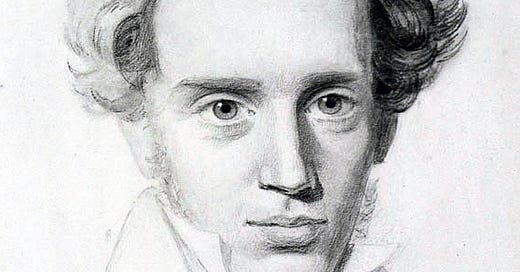The essence of Christianity is your own inner movement toward God
Nothing is more certain than your own experience
The wholly unreflective subject is naively convinced that if only the objective truth stands fast, the subject will be ready and willing to attach himself to it.
Søren Kierkegaard — Concluding Unscientific Postscript to Philosophical Fragments
Few authors can pack so much thought into a small number of words as could Søren Kierkegaard. Some others that come to mind are Lao Tsu, Wittgenstein, and King David (Psalms). Sometimes this ability to pack so much into a few words means that people will miss the essence of what is being written. So, for this essay, I am going to “unpack” a single paragraph from Kierkegaard, and try to break it up so that it is more understandable.
Now, immediately there is the possibility that you will be annoyed by this because you could probably do this yourself. I don't doubt that, but people are not used to reading things with this high an idea-to-word ratio, and so I think maybe some people will benefit from this explanation.
(Please also note that in what follows I will sometimes remove subordinate clauses from quotations in order to make the meaning of a sentence clearer.)
If truth is spirit, it is an inward transformation, a realization of inwardness; it is not an immediate and extremely free-and-easy relationship between an immediate consciousness and a sum of propositions...
Kierkegaard (ibid)
For Kierkegaard, all Truth (big T) is subjective – it can only be grasped by the soul, not by the brain. Thus, the truth of Christianity has to be felt and not argued about. It is not a conclusion at the end of a series of logical propositions. Wittgenstein learned this when he finished the Tractatus, which consists of a series of numbered propositions and conclusions from those propositions. In the introduction he comments that it's interesting to note how little is achieved when you have completed such a project.
(continuing the previous sentence)... even if this relationship is called by the name which stands for the most decisive expression for subjectivity: faith.
Kierkegaard (ibid)
So, faith is not found in a series of propositions (simple truths). It is not in the creeds or catechisms.
The unreflected personality is always directed outward, toward something over and against it, in endeavor toward the objective.
Kierkegaard (ibid)
People tend to look for the answers outside of themselves.
The Socratic secret, which in Christianity receives an intensification, is that the movement of the spirit is inward, that the truth is the subject's transformation in himself.
Kierkegaard (ibid)
The essence of Christianity is your own inner movement toward God.
Skepticism is much to be recommended. There one may learn thoroughly that the certainty of sense perception is uncertainty, is only an approximation.
Kierkegaard (ibid)
What you think you see with precision is only an approximation; this has been borne out by psychological experiments on perception and cognition in the 100+ years since Kierkegaard wrote this. And science, which is based on observation, is thus also only approximate.
The only thing that is certain is your own inner experience. This is a certainty that is beyond knowledge because it is not subject to doubt. As Wittgenstein pointed out, to say “I know that I am in pain” is pointless because, if you are, you cannot possibly doubt it.
If you experience God, then that is more certain even than that the sun will rise tomorrow.




